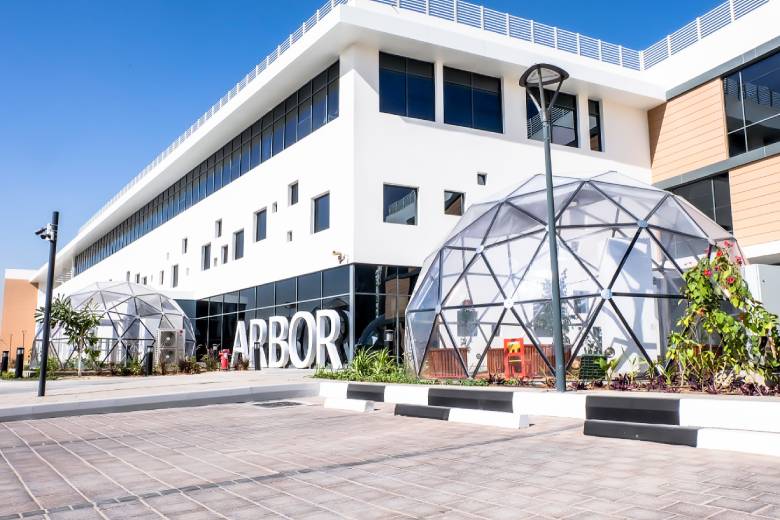Just as the upcoming COP28 signifies an important milestone in the global commitment to halving climate change and the leading role that the UAE has to play in that challenge, today also marks a major sustainability milestone for the staff and students at Arbor School, Dubai, as they work towards a more sustainable future.
In an exciting development which is estimated to avoid 40 tonnes of greenhouse gas emissions annually, Arbor is making the transition to run its ensure bus fleet on biodiesel made from waste, an ultra-low carbon alternative to fossil diesel. The school has installed a biodiesel storage tank onsite, enabling its fleet of buses to refuel conveniently as needed, reducing congestion on the local roads.
This has been made possible with the help of Dubai-based biodiesel producer Neutral Fuels, the agreement of transport provider STS and in collaboration with The Alliance for Sustainable Schools (TASS). The Alliance is a network of schools working together to accelerate the adoption of sustainability measures such as this in schools around the world.
Brett Girven, Arbor’s Principal and the convenor of the Middle East chapter of TASS, said: “Although we are not the first school in Dubai to use biodiesel in their school buses, I have been surprised by how easy it has been to make the change, and I’m surprised that more schools are not doing this. I hope that Arbor can help other schools make this transition, and as a member of TASS we have opportunity to do so.”
”I have been surprised by how easy it has been to make the change, and I’m surprised that more schools are not doing this.”
Anthony Dixon, TASS’s Founder and Chairman said: “We congratulate Arbor School on their sustainability leadership. This is a great example of how schools can do their part to address the climate crisis. Not only does it reduce their carbon footprint in a meaningful way, but it also develops future skills and empowers students and school communities to take action. It’s part of our mission to shine a spotlight on this example and help schools everywhere to make a similar change”.
Neutral Fuels Founder, Karl W. Feilder stated: “This is a fabulous example of the Dubai Circular Economy – we use the waste cooking oil generated by Dubai’s restaurants in our factory in Dubai, to create an ultra low carbon fuel used in Dubai’s school buses. Due to our advanced production technology, the resulting fuel can be used in any diesel engine without any modification, and without any negative impacts to fuel economy or engine life. The adoption of biofuel by Arbor School is a great way to remind students every day that practical solutions to mitigate climate change exist today, and can be easily adopted.”
Arbor School, has made a distinct commitment to provide an education which builds towards a more abundant future. Living up to this commitment incorporates all aspects of the school – a curriculum that develops the ‘eco-competencies’ to act; a conscious and diligent approach to reducing their ecological footprint; and the creation of a community committed to building a better future. The campus is utilised as a living laboratory and Arbor’s Principal Brett Girven hopes to “model sustainable practices within our school if we then encourage and expect our students and community to commit to these same changes at home. If we want to be the change we wish to see in the world, our students cannot have a disconnect between what we are teaching, and what they experience each day at school. So, committing to changes such as biofuels is one way of showing our students how it can be done.”
This is a great example of how schools can do their part to address the climate crisis.
Recognising the need for a student driven process, Arbor partnered with Metanoia to complete a sustainability audit of all facets of the campus – including procurement, transport, food and food waste, energy and water usage, uniforms, and facilities management. “I was surprised to find that as a community, we travel almost five million kilometres annually simply to get to and from school each day. Once we knew this, we had to act. Transitioning our bus fleet to biofuels and carrying out an awareness campaign to increase ridership will have a huge and relatively fast impact on our carbon footprint, as well as reducing traffic, reducing airborne pollutants and decreasing pressures on parking within the community. It is a systemic solution.”
So, what future plans does Arbor have to continue to reduce their footprint, particularly in the UAE’s Year of Sustainability? Principal Brett Girven states: “As a member of TASS, we recognise that our biggest impact will be in four areas – food, facilities, transport and school uniforms. We have made progress in each of these areas, but continue to focus on facilities improvements – including renewable energy sources. However, the biggest challenge is to ensure our curriculum builds the kind of education that means our students will now go forth into the world with the intent and capability to act. They will become co – designers of a ‘greener’ future. The UAE has launched the Green Education Framework and we intend to go above and beyond this to bring our mission and vision to life, a world where there is “Enough for all, forever”.





